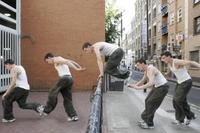 Wikipedia defining Parkour: Wikipedia defining Parkour:Le Parkour (also called Parkour, PK, l'art du déplacement, free-running) is a physical discipline of French origin. It is an art form of human movement, focusing on uninterrupted, efficient forward motion over, under, around and through obstacles (both man-made and natural) in one's environment. Such movement may come in the form of running, jumping, climbing and other more complex techniques. The goal of practicing le parkour is to be able to adapt one's movement to any given scenario so that any obstacle can be overcome with the human body's abilities.
According to founder David Belle, the "spirit" of parkour is guided in part by the notions of "escape" and "reach"; that is, the idea of using physical agility and quick thinking to get out of difficult situations, and to be able to go anywhere that one desires. However, fluidity and beauty are also important considerations; for example, cofounder Sébastien Foucan speaks of being "fluid like water," a frequently used metaphor for the smooth passage of barriers through the use of parkour. Similarly, experienced traceur (practicioner of parkour) Jerome Ben Aoues explains in the documentary Jump London that:
The most important element is the harmony between you and the obstacle; the movement has to be elegant ….If you manage to pass over the fence elegantly - that's beautiful, rather than saying ‘I jumped the lot.’ What's the point in that?
To some people (particularly non-practitioners), parkour is an extreme sport, to others a discipline more comparable to martial arts. Some consider it a combination of the two, recognising similarities between parkour and the stunts and techniques of Hong Kong martial arts star Jackie Chan, whose fight and chase scenes take place in industrial or urban environments. Still others see it as an art form akin to dance: a way to encapsulate human movement in its most beautiful form. Parkour is often connected with the idea of freedom, in the form of the ability to overcome aspects of one's surroundings that tend to confine - for example, railings, staircases, or walls. The practice of parkour requires considerable physical and mental dedication, and many adherents describe it as a "way of life." Wow, cool. I want to gracefully scale walls, jump from roof to roof, and slide down railings. I want physical barriers to be passed without pause. I want to fluidly go wherever I choose.
[ Culture | 2006-03-15 02:11 | | PermaLink ] More >
|
 Wikipedia defining Parkour:
Wikipedia defining Parkour: